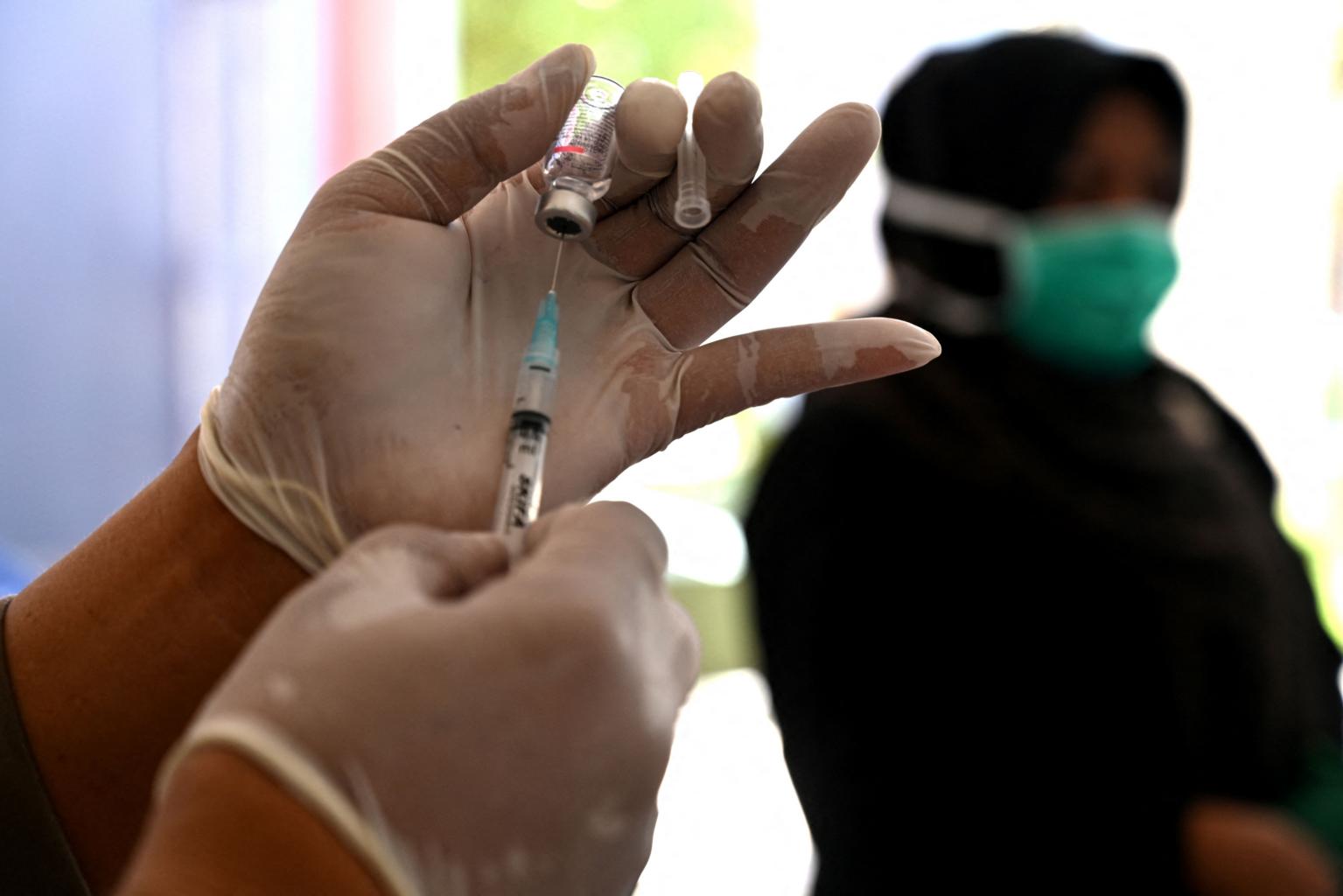Indonesia to roll out Covid-19 boosters in January, but concerns over inequality, supply loom
Sign up now: Get insights on Asia's fast-moving developments

Indonesia is anticipating another wave of infections that may be caused by the highly contagious Omicron variant.
PHOTO: AFP
Follow topic:
JAKARTA - Indonesia plans to roll out booster shots for the wider population from January, amid surging infections from the Omicron variant of the coronavirus.
But concerns over inequality and sufficiency of vaccine supply loom as nearly half of its targeted population have yet to be fully vaccinated.
Under the plan, the booster shots will be given free to health workers, support staff at health facilities, the elderly and beneficiaries of healthcare and social security subsidies. The rest of the population can obtain the jabs under a self-paid scheme.
"The booster vaccine programme is still waiting for the report and recommendations from the ITAGI (Indonesian Technical Advisory Group on Immunisation) on Jan 10," Coordinating Minister for Economic Affairs Airlangga Hartarto said earlier this week.
Dr Penny Lukito, chief of the Indonesia Food and Drug Monitoring Agency, said on Wednesday (Dec 29) that it is set to approve the use of vaccines for the booster vaccination programme soon.
Currently, booster shots are limited to healthcare workers in Indonesia.
The country reported 189 new cases of Covid-19 and seven deaths on Thursday, bringing the total infections and deaths to 4.26 million and 144,088 respectively.
The world's fourth most populous country of 270 million is anticipating another wave of infections that may be caused by the highly contagious Omicron variant. It had experienced a second wave driven by the Delta variant, which peaked in mid-July with over 56,000 new daily cases.
Civil society groups, including citizen data platform LaporCovid-19 and health think-tank Centre for Indonesia's Strategic Development Initiatives, have objected to the plan to roll out booster shots as the government has yet to fulfil its goal of inoculating 70 per cent of its targeted population, or 208.3 million people.
So far only 113 million, or 54.3 per cent, have been fully inoculated, based on the Health Ministry's figures, and disparity in vaccination coverage across the vast archipelago remains.
The groups have also demanded that the government scrap the self-paid vaccination programme that they say will hinder equal rights and access to vaccines.
From August to December, LaporCovid-19 had received more than 300 citizen reports on obstacles in getting inoculated, such as shortage of vaccine supply in their regions, and abuses of booster jabs.
Mr Firdaus Ferdiansyah, LaporCovid-19 coordinator for citizen advocacy and reports, demanded that the government focus on fully vaccinating 70 per cent to 80 per cent of the population by prioritising vulnerable groups, including the elderly.
"If the booster vaccine plan is executed, it will create new problems. With limited vaccine supply, there's a risk of ignoring full vaccination equity and marginalising vulnerable groups that should get the priority," he told The Straits Times.
Griffith University's epidemiologist Dicky Budiman noted that the booster vaccine roll-out will be vital to protecting vulnerable groups in the wake of the Omicron variant.
However, he told ST: "If the vaccine supply is insufficient, the priority should be to finish giving (the people) two doses first."
Epidemiologist Windhu Purnomo from Airlangga University shared a similar view, saying that there is a risk of diversion of shots that should be given to some 40 per cent of those not fully vaccinated to those taking booster jabs.
"If we use the supply that should go to those who have not been fully vaccinated, there will be many people who will not obtain full doses," he told ST.
Both Dr Dicky and Dr Windhu agreed that booster shots should be prioritised for high-risk groups, especially the elderly, if the vaccine supply suffices.
The Health Ministry's vaccination spokesman, Dr Siti Nadia Tarmizi, acknowledged that the availability of vaccines is the main issue.
"We don't want the population that should be inoculated to attain herd immunity... (to be deprived of) their jabs because the vaccine supply is used as boosters," she said.

